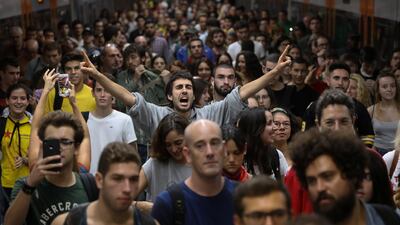In their tens of thousands, they came. From every walk of life, from every social strata, Catalans heeded the call on Tuesday for a general strike and converged on the regional capital of Barcelona. Highways were blocked, schools closed and much business halted across the region as workers and students alike joined the mass walk-out and took to the streets to protest against the use of force by police that left hundreds injured during a disputed referendum on the region’s secession.
The last time so many people had flooded the city was on Sunday, when they were met with violence from the security forces acting on the orders of the national government in Madrid. And on Wednesday, as at the weekend, the massed crowds were peaceful. This time, the Guardia Civil were notable through their absence as the people of Catalonia staged another display of unity.
________________
Read more:
Why do secessionist movements rarely gather international support?
________________
Bus and subway services essentially shut down in Barcelona, leaving disoriented tourists scrambling to find open cafeterias to avoid the protests. There were moments of tension when a handful of picketers forced the closure of shops that had remained open in the city's famed Las Ramblas boulevard, but elsewhere the demonstrations were largely peaceful.
Unions and grassroots pro-independence groups had called the strike on Sunday night after the violent crackdown by police and other forces on voters in a referendum that had been deemed illegal and invalid by the Spanish government before it even took place, and which has subsequently been dismissed by the European Commission as an “internal matter” for Spanish prime minister Mariano Rajoy.
“People are angry, very angry,” Josep Llavina, a 53-year-old self-employed worker who had travelled to Barcelona from a nearby town to participate in the protest outside the regional offices of Spain's National Police, told The Associated Press. “The national police brought violence with them. They have beaten people who were holding their hands up. How can we not be outraged?”
The general strike in Catalonia called by pro-independence groups was not fully backed by Spain’s two main unions, who invited workers to decide individually whether to halt work or not to protest against police violence, but not in support of secession.
“I disagree with the strike. In fact, at work nobody told me anything about a strike. So I decided to come,” said Jose Bolivar, 54, a town hall employee.
Office worker Antonia Cuello, 37, was in two minds about the industrial action.
“On one side it is a hassle to try to get to work in the midst of a strike,” she told The Associated Press. “We are suffering this because a few decided to behave in an improper way. On the other hand, I understand the circumstances surrounding the strike.”
Port workers also held a demonstration outside the regional headquarters of Spain’s ruling Popular Party, while firefighters planned a rally outside the interior ministry's regional office in Barcelona.
Protests were also to be staged outside schools that were used as polling stations where police acted with force to try to prevent Sunday's poll being held.

